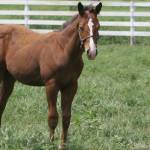Does Grazing Fescue Affect Weanling Thoroughbreds?

The price of a weanling Thoroughbred headed for the fall sales usually depends on the young horse’s pedigree, soundness, and physical appearance (conformation, height, muscling, and so on). In central Kentucky, many sales weanlings have been turned out on pasture that contains endophyte-infected tall fescue. Though studies have indicated fescue has an effect on growth and thyroid function in young foals as well as average daily gain in yearlings, no previous analysis has been made of the effect on weanlings.
A study conducted at the University of Kentucky was designed to evaluate the effect of dietary endophyte-infected tall fescue seed on growth and hormone response in weanling horses. Twelve Thoroughbred weanlings of both genders were used in the study and were divided into two groups. All horses were housed in paddocks with minimal forage where they received alfalfa (lucerne) cubes and hay. Twice a day, they were brought into stalls and fed concentrate individually. Weanlings in the treatment group were also given ground endophyte-infected tall fescue seed containing ergovaline at levels estimated to be approximately what would be consumed during grazing. All weanlings were weighed weekly, and periodic blood samples were analyzed for thyroid hormones, insulin, growth hormone, and prolactin. They were also examined for physitis, joint swelling, and body condition scores.
In this study, body condition scores and growth rates were not significantly different between control and treated horses. There was a slight trend toward higher foreleg physitis scores in the treated horses. All weanlings showed increased insulin concentrations post-feeding. There was a trend for insulin concentrations to be higher post-feeding in the treated compared to control yearlings. However, post-feeding insulin concentrations in treated yearlings declined from day 0 to day 35, while a similar change was not noted in control yearlings.
In this small group of weanlings during a short study period, exposure to ergovaline had minimal effects on the young horses. Trends in some variables suggest that further study might show different results for weanlings exposed to ergovaline over longer periods.








